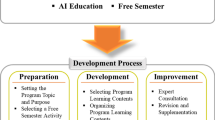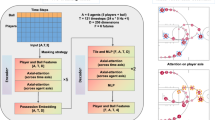Abstract
In order to improve the teaching quality and training efficiency of sports training, the human–computer interaction (HCI) technology of artificial intelligence technology is used to build an expert system, and the cognitive model of self-help navigation and hypertext navigation is designed for students, so that they can obtain the corresponding theoretical knowledge through the cognitive model in the system, and complete the training task better. The results show that the theoretical system of expert system can constantly update the knowledge system and case base. When students learn the relevant content and ask questions, the system can give some answers and assist students to complete the training work. The response time of the system is less than 5 s, the response time of more content is less than 10 s, and the accuracy of the system is about 90%. Therefore, the use of HCI technology in AI to design an efficient sports training environment teaching system is of great significance for improving students' learning efficiency, expanding the application of AI technology in the field of education and sports training, and for the development of technology and the improvement of teaching quality.



Similar content being viewed by others
References
Ahir K, Govani K, Gajera R et al (2020) Application on virtual reality for enhanced education learning, military training and sports. Augment Hum Res 5(1):7
Beal R, Norman TJ, Ramchurn SD (2019) Artificial intelligence for team sports: a survey. Knowl Eng Rev 34
Claudino JG, de Oliveira CD, de Souza TV et al (2019) Current approaches to the use of artificial intelligence for injury risk assessment and performance prediction in team sports: a systematic review. Sports Med-Open 5(1):28
Fister I, Fister D, Deb S, et al. (2018) Post hoc analysis of sport performance with differential evolution. Neural Comput Appl 1–10.
Foulquier N, Redou P, Saraux A (2019) How health information technologies and artificial intelligence may help rheumatologists in routine practice. Rheumatol Therapy 6(2):315–318
Galily Y (2018) Artificial intelligence and sports journalism: is it a sweeping change? Technol Soc 54:47–51
Haoyang L (2018) Analysis and prospect of sports coaching system based on artificial intelligence. J Beijing Sport Univ 41(4):55–60
Huan Z (2019) Design and implementation of human-machine game system based on SOPC. Sichuan Cem 4:109–109
Ling Lu, Lihua Li (2015) Teaching reform of artificial intelligence course based on modern teaching assistant system. Educ Mod 13:153–155
Nadikattu RR (2020) Implementation of new ways of artificial intelligence in sports. J Xidian Univ 14(5):5983–5997
Ning C (2019) Design and research of motion video image analysis system in sports training. Multimed Tools Appl 1–19
Novatchkov H, Baca A (2013) Artificial intelligence in sports on the example of weight training. J Sports Sci Med 12(1):27
Parker W, Forster BB (2018) Artificial intelligence in sports medicine radiology: what's coming?. Br J Sports Med
Patel D, Shah D, Shah M (2020) The intertwine of brain and body: a quantitative analysis on how big data influences the system of sports. Ann Data Sci 7(1):1–16
Penghai Z, Bi Lu, Bin L et al (2019) Auxiliary training expert system based on mixed programming of Java and Amzi! Prolog. J Yang Ling Vocat Techn Coll 1:5–9
Qing Ye, Changhua L (2017) Teaching design of artificial intelligence courses based on experiential teaching. Modern Vocat Educ 18:61–61
Rajšp A, Fister I (2020) A systematic literature review of intelligent data analysis methods for smart sport training. Appl Sci 10(9):3013
Santos OC (2019) Artificial intelligence in psychomotor learning: modeling human motion from inertial sensor data. Int J Artif Intell Tools 28(04):1940006
Tian G, Deng W, Gao Y et al (2019) Rich lamellar crystal baklava-structured PZT/PVDF piezoelectric sensor toward individual table tennis training. Nano Energy 59:574–581
Umek A, Kos A (2018) Smart equipment design challenges for real time feedback support in sport. Facta Univ Ser Mech Eng 16(3):389–403
Wang Y, Chen M, Wang X et al (2018) IoT for next-generation racket sports training. IEEE Internet Things J 5(6):4558–4566
Wang YF, Xu J, Xia X et al (2019) Storage and transportation of fresh products based on artificial intelligence environment. Sci Technol 18:82–82
Xue B, Liu T (2019) Research on emotional model of sports arena based on artificial intelligence emotion calculation. Clust Comput 22(6):14927–14933
Author information
Authors and Affiliations
Corresponding author
Additional information
Publisher's Note
Springer Nature remains neutral with regard to jurisdictional claims in published maps and institutional affiliations.
Rights and permissions
About this article
Cite this article
Wei, S., Wang, K. & Li, X. Design and implementation of college sports training system based on artificial intelligence. Int J Syst Assur Eng Manag 13 (Suppl 3), 971–977 (2022). https://doi.org/10.1007/s13198-021-01149-0
Received:
Revised:
Accepted:
Published:
Issue Date:
DOI: https://doi.org/10.1007/s13198-021-01149-0




